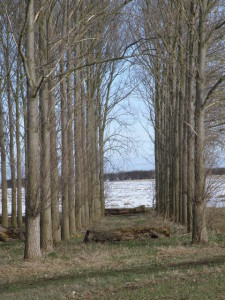We have much more to do and your continued support is needed now more than ever.
Doubling Down on Sustainability – GreenWood’s Oregon Poplar Farm

“The combination of these two certifications demonstrates GreenWood’s commitment to sustainability,” said NWF’s Barbara Bramble. “It takes good management to meet the requirements of RSB and FSC standards, but GreenWood has shown that it can be done and can help a business thrive.”
Barbara Bramble, Senior Adviser for NWF’s International Climate and Energy Program, serves as the chair of the RSB’s Board of Directors, and formerly held the same role with FSC-US.
These certifications assure that GreenWood’s operation is protecting the environmental, social and economic sustainability of the forest and its products. Here’s how it works – FSC and RSB are both multi-stakeholder initiatives, meaning they bring together business, industry, government and non-profit organizations to develop and maintain sustainability “standards.” These standards cover a wide breadth of issues – biodiversity conservation, greenhouse gas emission reductions, providing good labor conditions and more. Expertly trained third parties then assess the applicant’s operation and decide whether it meets the standards – and if so, the certificate is issued.

FSC is specifically for forest management – perhaps you’ve seen the FSC label on paper you’ve bought – and can cover the entire chain of custody of wood products all the way from the ground to the consumer. RSB is specifically for biofuels and biomaterials such as bio-plastic packaging, and has been rated as the best bioenergy standard by World Wildlife Fund (WWF) and International Union for Conservation of Nature (IUCN). Both certifications require that biological diversity and natural ecosystems be maintained, assuring that wildlife habitat will not be affected by sustainable use of the forest or feedstock.
Wood pellet energy in particular has come under heavy scrutiny lately as reports indicate that the carbon pollution, from harvest in the Eastern US to end use at British power plants, may actually exceed that of the coal it replaces. By earning RSB certification, GreenWood has demonstrated that its sustainable biomass energy represents at least a 50% reduction of greenhouse gas emissions compared to fossil fuels. Its cellulosic ethanol can be used as a replacement for gasoline, while wood pellets are used for heating and energy production at large-scale power plants.




















